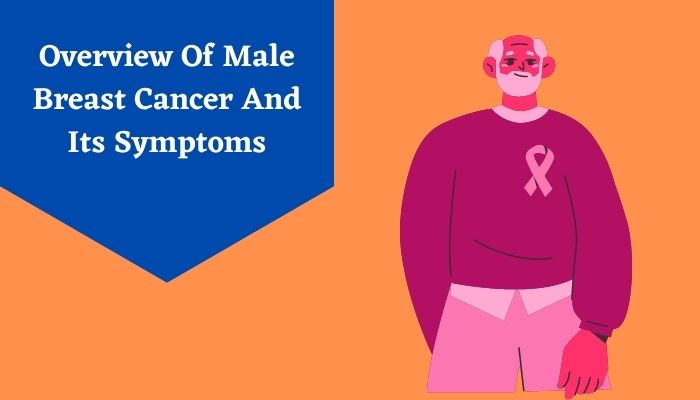When we hear the term breast cancer, we instinctively associate symptoms for women. However, male breast cancer is a serious condition that has very limited awareness. In light of the severity of the symptoms and their consequences, let us take some time to analyze what breast cancer in men really means and the male breast cancer symptoms.
What Is Male Breast Cancer And Who Does It Affect?
Breast cancer in men is very similar to breast cancer in women. A painful lump in the breast male can be detected under the chest cavity surrounding the pecs. The painful lump in breast males, upon diagnosis, is often found to be breast cancer, which is a form of tissue growth in the breast region.Male breast cancer is usually detected in older men even though it is possible to develop the condition at any age or stage of life. If detected early, you can have the excessive breast tissue removed or treated with radiation and chemotherapy.
Most cases of breast cancer in men are easily diagnosed and treated before it spreads. It is best to keep an eye out for the male breast cancer symptoms and seek treatment if you find any painful lump in the breast male.
What Are The Male Breast Cancer Symptoms?
The signs of male breast cancer are difficult to spot since it is unexpected and men usually tend to have tougher muscles in the chest region, which makes it difficult to identify a lump as a result of male breast cancer.Still, there are distinct male breast cancer symptoms that you can look out for such as:
- If there is pain, check to see if there are any lumps beneath the breast tissues.
- Check if, in any region of the chest, the area is thickening or hardening inexplicably.
- Check for any dimples or puckered skin on the chest area where breast cancer in men is a possibility.
- Examine any scaly skin tissues or redness around the chest area where it may feel lumpy under the skin.
- Confirm if your nipples are turning red.
- Check if nipples are scaling away the skin tissues.
- Check to see if the area in and around the nipple is turning inwards.
- Observe if there are any secretions in the form of discharge from the nipples.
What Are The Causes Of Breast Cancer In Men?
The common misconception that breast cancer only affects women stems from the fact that women develop more breast tissues during puberty. However, every individual has some amount of breast tissue in their body from birth. The lack of excessive estrogen prevents the breast tissues in men from growing.In both genders, the breast tissues consist of glands that produce milk, fat, and ducts that carry the fluid. Often, the causes of breast cancer in men stem from problems that evolve around these glands and ducts. Here are the four major causes of male breast cancer:
- Ductal carcinoma is a condition instigated within the milk ducts under the breast tissues.
- Lobular carcinoma is a condition where male breast cancer is instigated within the lobular glands that produce milk.
- Paget’s disease wherein the cancer is instigated in the area around the nipples.
- Inflammatory breast cancer stems from inflammation in and around the breast tissues in men.
- The age factor – The risk of developing male breast cancer is higher in men after the age of 60, although it can affect men of younger age groups too, it is rare.
- Exposure to hormones like estrogen – External introduction of estrogen can have adverse effects on the male body. If you use hormone-related therapies or drugs that stimulate the production or absorption of estrogen in the male body, there are higher risks of male breast cancer.
- Hereditary disorders - If there are people among your immediate family members who have breast cancer, you are more likely to develop it too.
- Liver disease – Conditions such as cirrhosis can often increase the counts of female hormones and reduce the number of male hormones in the body. Thus, it increases the chance of developing male breast cancer.
- Klinefelter’s syndrome – People born with this condition carry an extra set of the ‘X’ chromosome, which in turn affects the development of the testicles. Therefore, the body secretes more amounts of estrogen and less amount of androgens, thus upsetting the balance of the male body. This can lead to male breast cancer symptoms.
- Testicle surgery or disease – Male breast cancer can also be instigated after a condition of orchitis, which promotes inflammation in the testicles. A painful lump in the breast male may also be a result of orchiectomy, which is a surgery to remove one testicle.
- Obesity – A primary result of obesity is the release of increased amounts of estrogen in the body. In males, the situation often leads to male breast cancer symptoms.
The lack of awareness has caused many breast cancer cases in men to go unnoticed until the situation is critical. Male breast cancer is an uncommon but real concern with very serious consequences. Speak to a medical professional right away in case you spot any symptoms. If you feel like the causes of male breast cancer also include your demographics, it is best to thoroughly examine the region and consult the doctor if there are any lumps around the chest area.


